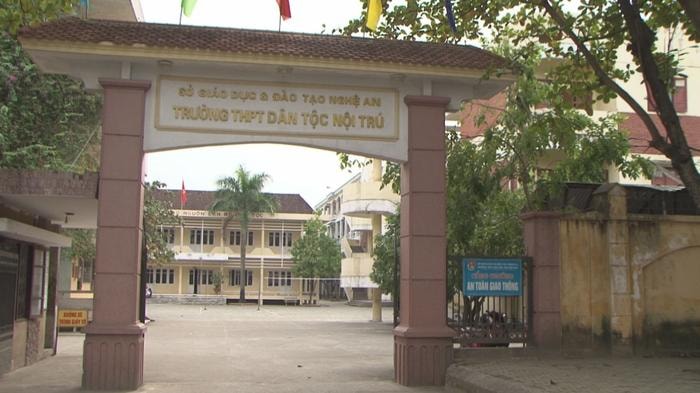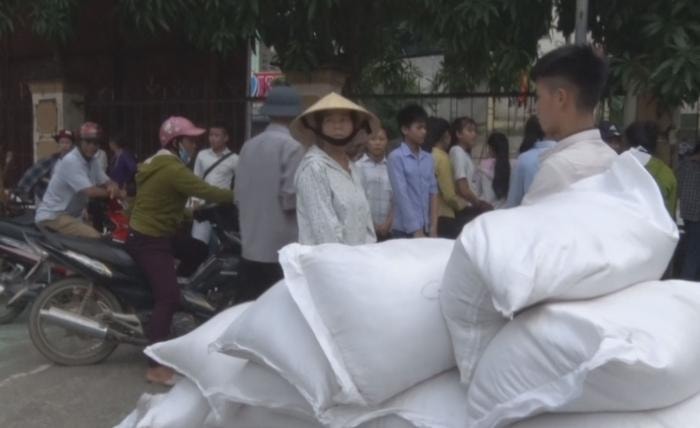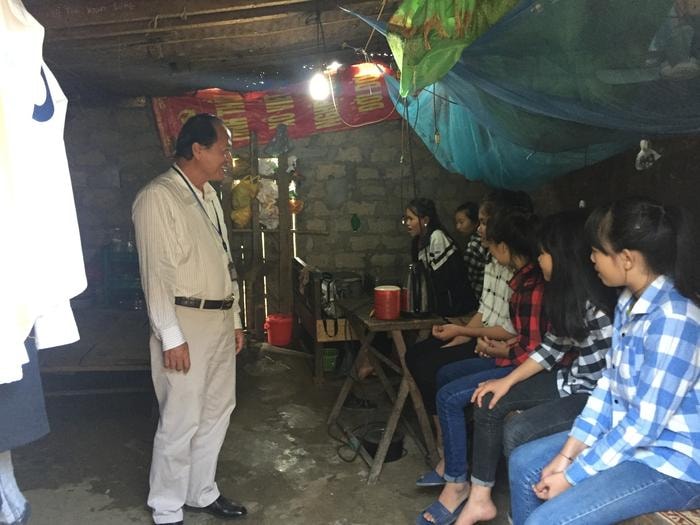Need to restore the form of ethnic minority high schools in mountainous districts of Nghe An
(Baonghean) -Thousands of students in mountainous districts of Nghe An are facing many difficulties and disadvantages, as the State has a policyEliminate high school boarding schools for ethnic minorities.
Implementing Decision No. 49 and Circular 06 of the Ministry of Education and Training, and now Circular No. 01, since 2013, Nghe An province has begun to abolish the type of Boarding High School for Ethnic Minorities (DTNT THPT) in mountainous districts. With the abolition of the DTNT THPT system, in reality, thousands of students in mountainous districts of Nghe An are facing many difficulties.
Accommodation and management problems
Looking at the buying and selling scene taking place right in front of the school gate, no one would think that this was a rice distribution campaign to support students in the mountainous areas. Just a few minutes after being distributed by the school, the rice, enough to last for 5 months, was sold by students of Tuong Duong 1 High School.
“The reason I have to sell the monthly rice is because I receive too much rice, so it can’t be kept for long. I have to sell some to get money to buy food, pay for electricity, monthly expenses and rent,” Thao Nguyen, a 10E student at Tuong Duong 1 High School, explained.
 |
| Both provincial ethnic boarding high schools only enroll about 1,000 students each year. Photo: Hien Chuong |
The situation of students using rice for support purposes but not for the right purposes and selling it to private traders... has been going on for the past 4 years. Previously, when the school was still a boarding school, the school strictly managed the study support policies such as rice, money... Now, according to the regulations of Decree 116, rice is distributed directly to students. However, most of the students did not use it for the right purposes.
According to the explanation of teacher Luong Van Nghe - Principal of Tuong Duong 1 High School, the reason why students sell the rice support is because 50kg of rice is provided in 2 semesters a year, so students will have difficulty in preserving it. Because they receive so much at once, they cannot eat it all, so they sell it and buy rice again the next day.
Following the teachers of Tuong Duong 2 High School, we went to the students' dormitory. To reduce expenses, 6 students had to rent a room together. The room was bare, empty, with only a few planks and mats used as beds. With no place to write, the bed became an impromptu study table for the students.
Most of the students have to rent houses in remote areas of Tuong Duong district. Some of them live more than 100km away from school such as Mai Son and Nhon Mai communes... Most of them are from poor families, and when they go to town to study, they have to manage on their own with the 480,000 VND and 15 kg of rice they are supported with each month.
Tuong Duong currently has 2 high schools, with 45 classes and nearly 1,600 students, half of whom are children from remote areas. This also means that about 800 students have to struggle with the problem of finding a place to live at the beginning of the new school year.
 |
| The children said that each time they were given 50kg of rice, they could not preserve it and could not eat it all, so they sold it to pay for their accommodation. Photo: Hien Chuong |
Teacher Nguyen Van Hanh - Principal of Tuong Duong 2 High School discussed: "The most worrying thing is that while maintaining the number of students in mountainous districts is always a difficult problem, the elimination of boarding schools can lead to a consequence that is the situation of students dropping out of school increases, because students use unscientific support policies, in just a short time they use up all the rice, money... that are allocated, while the family's economy is poor, not enough to provide for them to continue studying. In addition, renting a room outside the house, without a manager, students easily fall into social evils". |
In addition, a paradox is that while many students have difficulty with accommodation, the abolition of boarding has led to all the facilities previously invested by the State such as dormitories, rooms, beds... being left empty, a huge waste. These difficulties and shortcomings have been a reality for the past 4 years, since our province abolished boarding in high schools in mountainous districts.
“Our school used to be a boarding high school for ethnic minorities, but now it has been converted into a normal high school, so the old boarding facilities are still there, but there is no boarding policy so we cannot let students stay there,” said teacher Luong Van Nghe, Principal of Tuong Duong 1 High School.
Policy adjustments are needed.
According to Circular No. 01/2016 of the Ministry of Education and Training, in Section 1, Article 4 stipulates: "Mountainous districts, islands, and ethnic minority areas only establish a system of ethnic minority boarding schools at the junior high school level".
And Section 2 of this article also has an additional provision that "in case of necessity, to create a source of cadres who are children of ethnic minorities in areas with especially difficult socio-economic conditions, the Provincial People's Committee can assign district-level boarding schools for ethnic minorities to train at the high school level".
In our province, the abolition of boarding high schools has been carried out since 2013, however, to date, Section 2, Article 4 has not been implemented. Therefore, thousands of students in 11 mountainous districts in the province are currently at a disadvantage.
“Of the total number of students in the school, 656 are ethnic minority students, 401 of whom are from remote areas and need to stay in boarding schools to study. However, from 2013-2014 until now, the schools have been converted to normal high schools, and boarding schools are no longer available, which has greatly affected the students’ studies, especially those from remote areas. The students themselves have to stay outside to study, causing difficulties in student management,” said teacher Nguyen Van Hai, Vice Principal of Con Cuong High School.
 |
| 6 children have to share a cramped rented room. Photo: Hien Chuong |
Not only do students suffer when boarding is abolished, but teachers also face many difficulties. Teacher Pham Thi Minh Thuy, a teacher at Tuong Duong 1 High School, commented: "When the school's boarding policy was abolished, all teachers in the school did not have any allowances, teachers did not have any policies, and many times had to spend their own salaries to help students with living expenses."
Obviously, from the difficulties in implementing policies for education in ethnic minority areas, it can be seen that the elimination of boarding school type in the high school system still faces many obstacles and shortcomings. The whole province has 11 mountainous districts, with an average of about 6,500 - 7,000 students entering grade 10 each year. Meanwhile, the enrollment quota of both ethnic minority high schools in the province is only 11 classes with about 1,000 students/year.
Therefore, the remaining students, although also living in areas with special socio-economic difficulties, are not fortunate enough to enjoy preferential treatment like students in these schools. "The Department of Education and Training has also seen these shortcomings and will soon have recommendations to build boarding schools for high school students like the ones at lower levels that we have effectively implemented," said Mr. Nguyen Trong Hoan - Chief of Office of the Department of Education and Training of Nghe An.
Charter
| RELATED NEWS |
|---|

